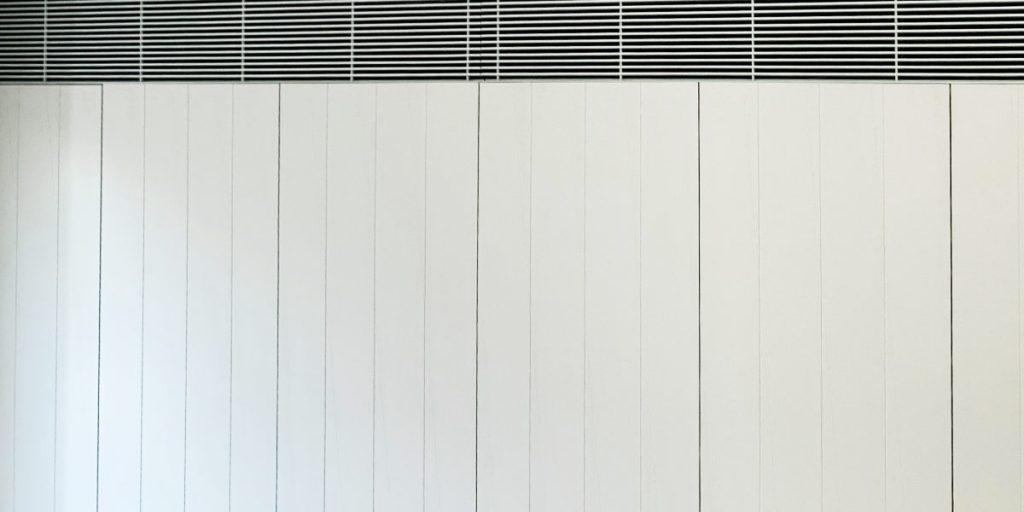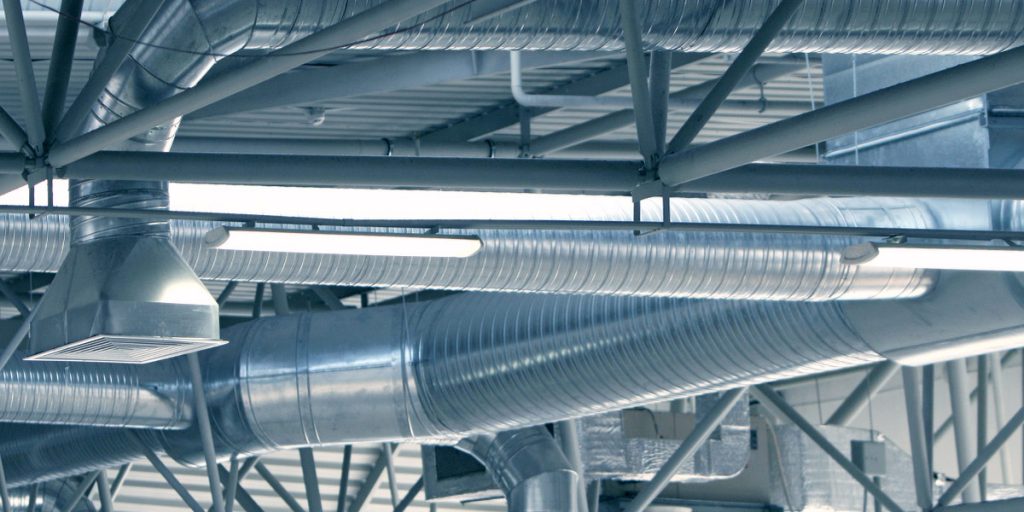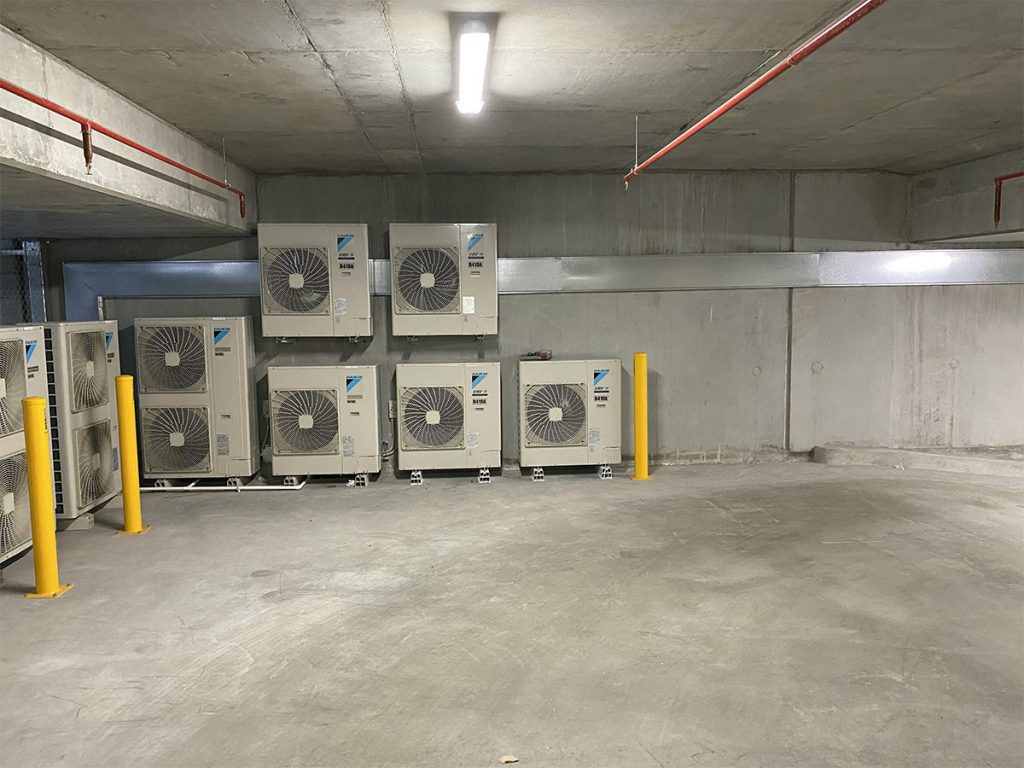Like home HVAC systems, commercial HVAC systems are important to the comfort of those inside the building; however, there are usually many more people to please. That’s why it’s important to know when you should replace your commercial HVAC system – you don’t want your students, employees, volunteers, etc., to have to work in an uncomfortable environment.
As buildings age, facilities managers will often try to stretch the lifespan of outdated systems while still trying to make sure those systems live up to current standards. As these systems age, however, their structural problems worsen. Allowing these issues to remain unresolved can have a significant impact on a company’s core business.
As heating and cooling units age, they lose their efficiency. This can lead to frequent breakdowns, costly service visits, or an expensive replacement. We’ve compiled a list of factors to consider when determining if you should repair or replace your HVAC system—and what to consider when purchasing a new unit.
A commercial business has the unique challenge of providing a comfortable environment for both the customer who enters the business and the employee who works inside the establishment. We all understand that a comfortable worker will be more productive, just as a comfortable shopper will spend more time in your business. If you own a business, you can’t afford to be without a reliable HVAC system.

Your HVAC system is responsible for keeping you comfortable throughout the year. In the winter, the system will keep you warm, and your HVAC system will keep you cool in the summer. It also ventilates the air in your home to circulate fresh air and help remove dust and allergens.
But what happens when an HVAC system is no longer performing as efficiently as it should? Our exclusive range of services for HVAC Design and Installation Melbourne will help you in many services, including Installation, or Maintenance, or Service & Repair.
Why Is Your HVAC System Important?
A mechanical system that controls the environmental conditions within a facility’s four walls, a building’s heating, ventilation, and air conditioning system (HVAC) is a critical system that should never be ignored. When operating properly, an HVAC system heats and cools both commercial and residential structures, filters and cleans indoor air, maintains optimal humidity levels and provides a comfortable indoor environment for occupants.
According to a recent Grainger survey of facilities managers, 66 per cent of respondents view HVAC as the most critical area to address for older buildings. Of those managers who are dealing with old HVAC systems or units, 64 per cent said their biggest problem is inefficient energy usage. Another 55 per cent said they couldn’t find parts to fix their existing equipment, and 53 per cent experience frequent breakdowns.
Signs Indicating You Need To Replace Your Commercial HVAC System
Your HVAC System Is More Than 10 Years Old
According to the Department of Energy, you should replace your commercial HVAC system once every 10 years. Modern air-conditioning units are generally durable, but some of their components may start to show signs of wear and tear after about 10 years.
If you have been properly maintaining your HVAC unit, you may see it working well for up to 15 years, with little or no major issues. However, the rate at which your system wears out also depends on how often you use it. Overly strained units tend to experience more problems and need to be replaced sooner.
An older commercial HVAC system is more likely to experience major issues. This can have a significant impact on its ability to cool your entire office, resulting in a less comfortable work environment. Additionally, you’ll have to service and repair the unit more often to keep it functioning effectively. In the end, you may find that it’s more cost-effective to replace it than frequently shelling out money for repairs
According to the Department of Energy, you should replace your commercial HVAC unit once every 10 years. Granted, modern heating and air conditioning systems are built with performance and durability in mind, but some of their components can start to fail after 10 years. However, if you observe routine maintenance and address repairs as soon as possible, you can expect it to last for up to 15 years. Also, the deterioration rate of your unit depends on its usage. A unit used heavily will need to be replaced sooner than a unit that’s rarely used.
You Notice Inconsistent Temperatures In Your Office
An aging commercial HVAC system is more likely to struggle to maintain consistent, comfortable temperatures in your office. This may result from a number of issues, such as an inaccurate or damaged thermostat, clogged filters, leaky ducts, low fluid levels, or damaged motors. Check out HVAC Breakdown and Repairs Services page which has everything you might need near you.
Typically, inconsistent temperatures occur because your HVAC unit isn’t powerful enough to distribute air throughout an indoor space properly. Unfortunately, this is a common problem with older models. So if you decide to keep your old air-conditioning unit, you have to be prepared to work in discomfort and pay higher energy bills.
On the other hand, getting a new HVAC system will help you create a more conducive work environment for yourself and your employees. For optimal comfort, make sure you choose a unit that suits your office’s size, layout, and location.
One telltale sign of an aging commercial HVAC system is if it has difficulty keeping indoor office temperatures consistent. This issue can have different causes, such as a faulty thermostat, dirty filter, leaky ducts, low fluid levels or damaged motors. Most of the time, inconsistent temperatures occur because your HVAC unit isn’t powerful enough to distribute air evenly throughout the indoor space. This problem is more apparent in older units, so it’s in your best interest to upgrade to a more modern unit to create an environment conducive to comfort for you and your employees.
Wear & Tear
Depending on the quality of the product and the level of maintenance it has received, your HVAC upgrade could be overdue by the time it gets to 15 years old. If it has experienced a significant amount of wear and tear, it probably doesn’t heat or cool as efficiently as it used to. Consider your energy bills – if they’ve increased recently, your HVAC unit may be the culprit.
Malfunctions
When it comes to HVAC units, some malfunctions are simple to repair (such as a blown fuse, dirty filter, or a motor that needs oiling), while others (like a broken furnace fan or refrigerant issues) should be left to the pros. If the malfunctions your HVAC system is experiencing are serious enough, however, you may need to replace the system entirely. Schedule an appointment with a commercial HVAC repair specialist and have a professional take a look.

If you spot excessive moisture on walls and windows or rust on pipes and appliances, your HVAC system is not doing its job. If the problem is serious, HVAC equipment will likely need to be replaced.
Replacing commercial HVAC equipment before it fails entirely can save you time and money. However, all commercial HVAC systems will need to be replaced at some point, so keep an eye on yours before a costly failure happens.
Unusual Noises
There’s definitely something amiss if your HVAC is making grinding or squealing noises. Address these noises immediately as this is a sign that equipment is failing and could soon break down. Depending on the source of the issue, typical maintenance may not be enough to fix the problem.
Energy is Being Lost Through the Exhaust
There will necessarily be some energy loss through HVAC exhaust, but replacement may be a wise choice if this has become a chronic problem in utility costs. New HVAC equipment can reduce this energy loss by 50 – 80% and provide you with a return on investment over time.
Your Electric Bills Keep Rising
Energy bills vary significantly from one season to another. However, bills for the same months should be somewhat similar in different years. If you find that your company’s utility bills for a particular month have been continually rising from year to year, it’s a big sign that you should replace your commercial HVAC system. HVAC units tend to become less energy efficient as they age. This is especially true if you fail to service your system at least once a year.
You expect to see fairly large utility bills for your commercial properties, and it’s just part of the game. If your monthly energy costs are higher than they were in the same month of previous years, it’s a sign that the HVAC system needs to be replaced. A new, energy-efficient HVAC system will significantly reduce your energy use and get your utility bills back to a more comfortable level.
Getting a new HVAC unit can help you save substantially on energy costs because the latest air-conditioning systems are designed to deliver optimal efficiency. Consider choosing a system with the energy efficiency label for maximum cost savings. The Department of Energy estimates that you can reduce your cooling costs by up to 30 per cent if you replace a 12-year-old HVAC system with an energy efficiency model.
Your HVAC Unit Is Acting Weird
Under normal circumstances, your commercial HVAC system works quietly behind the scenes to keep the building comfortable. However, if it starts to make odd noises like bangs, clangs, and squeals, it’s a sign the unit is beginning to fail. Likewise, there’s a problem if unusual odours start to waft around when the unit’s running. It’s likely the unit has reached the end of its life and that it’s time to get a new commercial HVAC unit installed.
Unusual Odours
Unusual odours coming from your HVAC system are a serious sign of trouble and should not be ignored. In this situation, indoor air quality may be compromised, putting everyone in the building at risk of airborne disease. Unusual odours indicate at least a partial system failure and will almost certainly require equipment replacement.
Outdated
Several years ago, the Environmental Protection Agency (or EPA) began a “phasedown” process of a type of refrigerant known as R-22. R-22 was a very popular refrigerant in older HVAC systems but has been discovered to deconstruct the ozone layer and promote global warming. If your HVAC system was installed before 2010, it likely still operates on this type of refrigerant, so you may want to consider a newer, more environmentally friendly option.
Poor Indoor Air Quality
Your commercial HVAC unit greatly determines the indoor air quality of your office. This is even more apparent in the summer when humidity levels are higher. If you have a functional air conditioner, it should produce clean air that’s easy to breathe. On the other hand, having an old, worn unit can result in poor air quality due to the accumulation of dust, mould, and mildew.
Productivity
When individuals are at a comfortable temperature, they tend to be more productive. If your HVAC unit is malfunctioning or broken, you may lessen the productivity of the people inside the building (which can be a big problem for business owners). Inspect the unit carefully and decide whether you need a new one or not. If you’re not sure, you can always call our commercial HVAC repair experts – we can evaluate it for you. Looking for Commercial HVAC Melbourne? Look no further, Outline Air Melbourne has you covered.

More Reasons to Monitor Your Aging HVAC Systems
Another consideration when deciding whether to keep or replace an older HVAC system is the cost of ongoing maintenance and upkeep, both of which can get more expensive as these systems age. Even minor repair bills can begin to add up over time and outpace the cost of purchasing a brand new, commercial HVAC system. You should also consider the system’s downtime record and the potential energy savings that could come from buying a more modern HVAC system.
Finally, don’t overlook the comfort of your employees, customers, and other stakeholders who spend time at your facility. A roasting hot summer day with no air conditioning can be just as bad as a cold winter day when the heat refuses to go up a few extra degrees. Either extreme can hurt productivity and even lead to lost sales.

